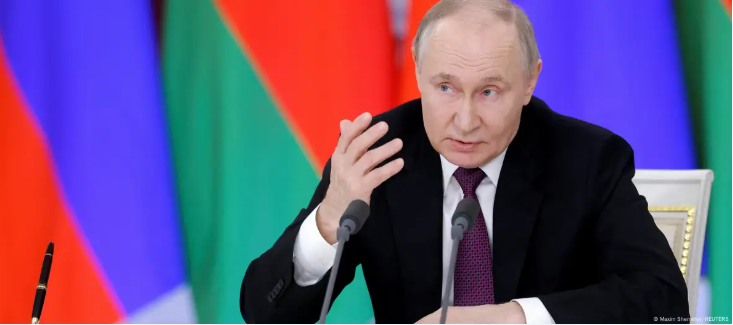Vladimir Putin has served as either prime minister or president of Russia since August 9, 1999. How has the former KGB officer managed to continuously expand his power?
Putin has strengthened his grip on power over a quarter of a centuryImage: Maxim Shemetov/REUTERSIn what was largely a formality, Vladimir Putin was confirmed in office in the Russian presidential elections with 52.9% of the vote on March 26, 2000.
The result of the elections was a foregone conclusion. When Boris Yeltsin unexpectedly resigned from office on December 31, 1999, Putin, who had been prime minister since August 9, 1999, also took over the office of president as per the constitution.
Putin has now been in power for 25 years, taking a strategic approach to his rise to become the autocratic and undisputed ruler of Russia, even if he was not president for a few years.
A vacancy in the Kremlin
As the Russian constitution at the time did not allow a president to rule for more than two consecutive terms, there was a vacancy in the elections on May 7, 2008.
Putin’s confidant Dmitry Medvedev, former Chairman of the Gazprom Supervisory Board, replaced Putin in office. One day later, Russia’s parliament, the Duma, elected Putin as the new head of government with 87.1% of the vote at Medvedev’s suggestion. Even though Medvedev now held the highest office, Putin continued to pull the strings behind the scenes.
In the course of these 25 years, the Russian president has transformed his country into the “strongest personalized dictatorship in the world,” said Russian political scientist Mikhail Komin.
He told DW that this was only possible because, over the quarter century he has been in power, Putin has persistently undermined all of Russia’s political institutions.
Regional control as the foundation of power
It all began with the abolition of regional autonomy, Komin explained. The Kremlin created its instrument of control in the Russian regions, laying the foundation for a consolidation of power.
Another Russian political scientist, Grigory Nishnikov, based in Finland, shares this view. “If we think back to the Russia of the early Putin years, we can point to several autonomous centers of power, both constitutional and informal, such as the oligarchs,” he told DW. “They all formed a sort of counterweight to the Kremlin.”
Putin destroyed all this, said Nishnikov, centralized everything, and focused Russia’s system of power on himself.
However, he believes this isn’t the only reason why the Russian president has remained in power for so long. There have been plenty of events over the past 25 years that could have been dangerous for Putin, namely:
• the protests in Moscow’s Bolotnaya Square following the 2011 parliamentary election,
• the risk of instability in Crimea after the Ukrainian peninsula was annexed in 2014,
• the unrest that followed the controversial pension reform in 2018,
• massive protests in support of the late Kremlin critic Alexei Navalny across Russia over the next few years,
• the start of the war in Ukraine in early 2022, accompanied by protests on the streets of Moscow and St. Petersburg.
However, every act of popular resistance was followed by even greater repression. “And new adversaries were always eliminated in the course of these events,” said Nishnikov. As a result, he does not believe there is anyone left now who could challenge Putin.
Putin and Trump: Brothers in spirit?
In terms of foreign policy, there are signs of a rapprochement between the United States and Russia, which began when US President Donald Trump had his first term in office (2017- 2021). The first personal meeting between Trump and Putin took place in July 2018 at the Russia-US summit in Helsinki.
“For Putin, Trump is the greatest gift of his political life,” explained political scientist and historian Helmut Müller-Enbergs in an interview with the German news platform T-Online.
That, said the expert from the University of Southern Denmark, has become evident during negotiations to reach a ceasefire between Russia and Ukraine. Putin, said Müller-Enbergs, essentially offered Trump “[Ukraine’s] raw materials and the prospect of a fulfilled election promise” to end the war.
Kremlin spokesman Dmitry Peskov also recently hinted to the international press that Trump and Putin have a close relationship and speak to each other more often than previously assumed.
Source: https://www.dw.com/en/25-years-of-putin-russias-president-cements-his-power/a-69844205










